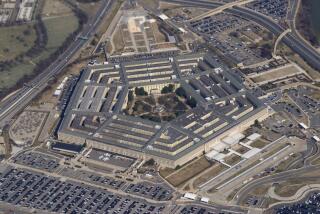Germ Research Risk Discounted by Army
- Share via
WASHINGTON — Opponents of the Pentagon’s germ warfare research have “very much exaggerated” the program’s risks to the environment and to the health of its workers, the Army said Thursday.
The environmental impact statement, which was immediately criticized by opponents of the germ warfare program, was issued as a Senate committee released a stinging assessment of the Pentagon’s efforts to ensure the safety of programs to develop new chemical and biological weapons.
Response to Lawsuit
In the environmental report, which was drafted in response to a lawsuit seeking to halt the germ warfare program, the Army conceded that research posed “minor adverse” risks to workers inside some research facilities.
But it insisted that its program “is conducted under rigorous controls which serve adequately to protect the health and safety of the work force and the quality of the human environment.”
The Army conducts or contracts for germ warfare work at 120 sites worldwide, the report said, including nine research centers in California, one of them at UCLA. The program is defensive in nature, the report added, and must continue if the United States is to counter the potential use of biological weapons by its enemies.
The Army’s report was attacked by Jeremy Rifkin, president of the liberal Foundation on Economic Trends, which had filed the suit to stop the germ warfare research program on grounds that the Army had not analyzed its environmental effects.
Rifkin called the study “shoddy and incomplete” and vowed to file a second suit to halt the research program unless the Pentagon “completely revises” the report.
Dangers to Public
Rifkin charged that the study failed to assess in sufficient detail the dangers to public health if only tiny amounts of the viruses, bacteria and toxins should escape or be intentionally released from even one of the 120 laboratories and facilities engaged in biological weapons research.
“It could spread to surrounding population areas, causing injury and death to human and animal populations on the scale of a nuclear meltdown,” said Rifkin, whose group has also sued to halt the Pentagon’s proposed construction of a new germ warfare research center at Dugway Proving Grounds in Utah.
The Senate study, prepared by the staff of the Senate Governmental Affairs subcommittee on oversight, charged the Pentagon with “serious failings” in providing for the safety of the nation’s chemical and biological warfare programs.
It singled out the managers of the Pentagon’s germ research for their “particularly startling” failure to outline adequate safety regulations for all the Defense Department’s labs and contractors.
The Defense Department’s “safety protections appear to be fragmented and, particularly for contractors, completely inadequate,” the report said. “There is no comprehensive set of safety regulations for research with biological warfare agents and toxins, no emphasis on safety in the contractor program and no office that monitors contractor safety.”
Report Cites Accidents
The Senate report noted that accidents have occurred in the handling of potentially deadly biological material. Vials of biological warfare agents have been misplaced or spilled, it said, employees have been exposed to deadly toxins and a fire once broke out in the high-containment laboratory of the Army’s leading germ warfare facility at Ft. Detrick, Md.
The United States is a signatory to the 1972 Biological Weapons Convention, which prohibits the production of germ weapons but permits research designed to detect and protect against their use by others.
The Army, stressing that all its research complies with that accord, is planning a stepped-up germ research program, including construction of a $5.4-million test facility at Dugway.
More to Read
Sign up for Essential California
The most important California stories and recommendations in your inbox every morning.
You may occasionally receive promotional content from the Los Angeles Times.














